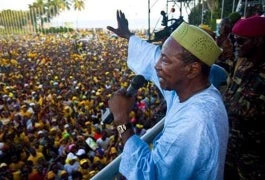
President Condé’s declaration makes clear that Guinea has no time to moan about the past. Embracing the future means welcoming and tackling the huge backlog of work that decades of neglect and political conflict have bequeathed to the country. The people of Guinea have clearly had enough and are in a hurry to put that past behind them. They made all of Africa proud when they took the first successful step in building a capable state by staging a highly competitive democratization process, culminating in the military handing power over to the first civilian president in more than three decades.
While the nation has clearly expressed determination to embrace a future of prosperity, some rather daunting questions remain: What exactly should Guinea do to translate her tremendous potential into reality? Given the size and nature of this backlog of challenges, and the understandably limited capabilities to address them, how does Guinea chart a feasible path forward? These questions were on everyone’s mind during a recent visit to Conakry by a World Bank delegation that included the Bank’s Vice President for Africa, Oby Ezekwesili. Here are a few of the suggestions that came out of meetings with Government, civil society, political parties, and the private sector:
- The new Guinean leadership needs to set up safety net programs that offer the most protection to the largest number of vulnerable and poor citizens. This is absolutely urgent. Guinea is a rich country, so poverty is an unacceptable outcome for its peoples; particularly, given the nation’s rich endowment in natural resources.
- There must be a national dialogue to build consensus on social and economic issues. Stakeholders strongly expressed the desire that President Condé and his government consult and listen to them before embarking on reforms and during their implementation. They felt really passionate about the roles they can play in rebuilding their country, appealing to the Bank to help, not only in bringing Guineans around the same table, but, notably, to facilitate dialogue between citizens and their president and other government officials. As the World Bank’s new Africa Strategy states, Governments across Africa must seek the buy-in and support of their citizens in the pursuit of the very difficult reforms and policy changes Guinea must implement.
- Guinea needs to diversify its economy. The country’s steady economic growth remains too heavily reliant on an undiversified mining sector, which has not only failed to generate enough jobs in this country of 12 million inhabitants, but could also be directly blamed for the neglect of Guinea’s enormous agricultural potential.
- The modernization and professionalization of the armed and security forces of Guinea is essential. The top brass of the military and security forces agree that this reform must be embarked on urgently in order to deepen improvements to civil-military relations, foster national reconciliation and development. The Bank heard President Condé's request to help professionalize and redeploy the military into development work, including road construction, agriculture and housing and agreed to work closely with other development partners to bring this about in an orderly manner.
- Promoting good governance and building public institutions and a public sector that work must be a central pillar of the reform process. As the head of Guinea’s Economic and Social Council Michel Kamano – a civil society group that advises both the President and Transitional National Council – explained: “The only governance we have practiced very well is bad governance.” President Conde himself put it even more starkly: “I inherited a country, but not a state.” Pushing for the long-term need for good governance and institution building, as outlined in the Africa Strategy is something that members of the Guinea government, its armed and security forces, civil society and the private sector all agree that Guinea can do more of. The nation’s people expect more from its political and economic leaders.
It is evident that Guinea has a large and ambitious agenda ahead of her. Unfortunately, not all tasks can be addressed simultaneously, so it is of prime importance to set priorities, an always taxing endeavor. How can the World Bank help? We are determined to approach this challenge (of prioritization) in a spirit of supportive partnership, recognizing that this is a challenge best taken on by the Guinean people. From Oby through to the Guinea team, our commitment is to be reliable supporters of this process... supporting, not pre-empting, the local effort. As Oby has stated, “We will be very strong partners, working with you, but we cannot do the reforms for you… reforms must be done by Guineans themselves. Since Guinea is back, we believe Guinea can make it!”
photocredit: presidentalphaconde.com


Join the Conversation